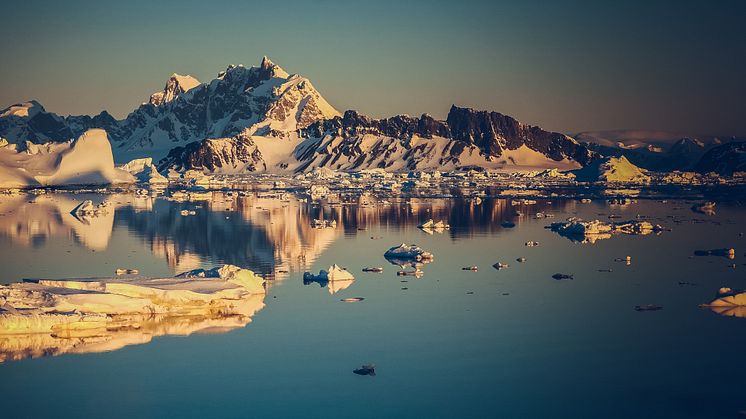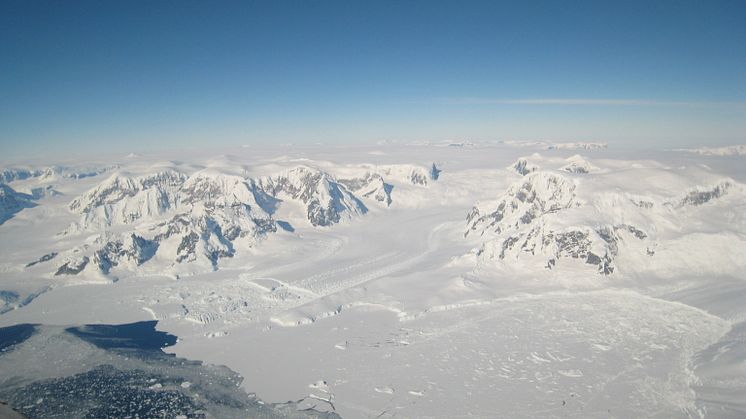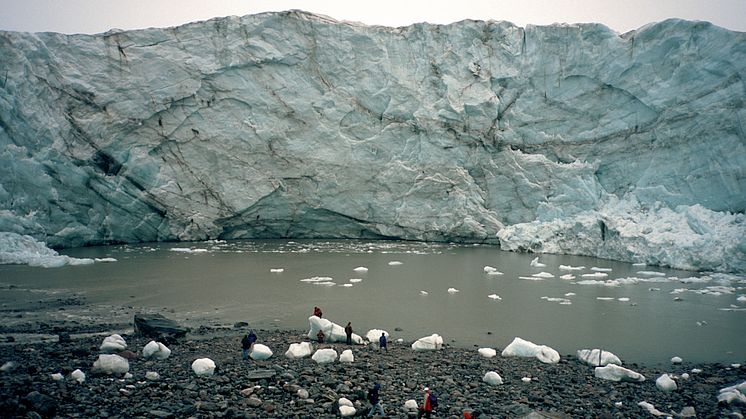
Press release -
Increased West Antarctic ice sheet melting is ‘unavoidable’, say scientists
The West Antarctic ice sheet will continue to increase its rate of melting over the rest of the century, no matter how much we reduce fossil fuel use, according to British Antarctic Survey (BAS) research, supported by Northumbria University, and published in the journal Nature Climate Change.
A substantial acceleration in ice melting likely cannot now be avoided, which implies that Antarctica’s contribution to sea level rise could increase rapidly over the coming decades.
Scientists ran simulations on the UK’s national supercomputer to investigate ocean-driven melting of the West Antarctic Ice Sheet, to find out how much is unavoidable and must be adapted to, and how much melting the international community still has control over through reduction of greenhouse gas emissions.
Taking into account climate variability like El Niño – a phenomenon which involves the warming of surface waters in the eastern Pacific Ocean – the research team found no significant difference between mid-range emissions scenarios and the most ambitious targets of the Paris Agreement on climate change. Even under a best-case scenario of 1.5°C global temperature rise, melting will increase three times faster than during the 20thcentury.
The West Antarctic Ice Sheet is losing ice and is Antarctica’s largest contributor to sea-level rise. Previous modelling found this loss could be driven by warming of the Southern Ocean, particularly the Amundsen Sea region near the coast of the Pacific sector. These glaciers contain enough ice to raise global mean sea-level by up to five metres.
Around the world millions of people live near the coast and these communities will be greatly impacted by sea level rise. A better understanding of the possible future changes will allow policymakers to plan ahead and adapt more readily.
Lead author Dr Kaitlin Naughten, a researcher at the British Antarctic Survey, said: “It looks like we’ve lost control of melting of the West Antarctic Ice Sheet. If we wanted to preserve it in its historical state, we would have needed action on climate change decades ago. The bright side is that by recognising this situation in advance, the world will have more time to adapt to the sea level rise that’s coming. If you need to abandon or substantially re-engineer a coastal region, having 50 years lead time is going to make all the difference.”
While future ocean warming and the increase in ocean-driven melting is now inevitable, it remains unclear how much ice exactly will be lost from the Antarctic continent as a result. To investigate this link, co-author Dr Jan De Rydt from Northumbria University’s Department of Geography and Environmental Sciences, ran a series of numerical ice-sheet simulations.
Results show that vulnerable areas of West Antarctica's floating ice margins will be exposed to a warming ocean, irrespective of how climate change continues to unfold. In those regions, increased ocean melting can lead to rapid and irreversible loss of ice, causing a significant increase in Antarctica's contribution to sea level rise over the next decades to centuries.
“Thanks to the availability of state-of-the-art numerical codes, we are able to simulate how changes in the ocean will impact on the world's ice sheets more accurately than ever before,” explained Dr De Rydt. “Our ability to simulate such key processes will ultimately lead to greatly improved projections of sea level change, and help us built a more resilient future under global warming. Researchers at Northumbria University and the British Antarctic Survey play a world-leading role in the development and use of such numerical codes, including the ones used in this study.”

In total, the research team simulated four future scenarios of the 21st century, plus one historical scenario of the 20th century. The future scenarios either stabilised global temperature rise at the targets set out by the Paris Agreement, 1.5°C and 2°C, or followed standard scenarios for medium and high carbon emissions.
All scenarios resulted in significant and widespread future warming of the Amundsen Sea and increased melting of its ice-shelves. The three lower-range scenarios followed nearly identical pathways over the 21st century. Even under the best-case scenario, warming of the Amundsen Sea sped up by almost three times the current temperatures, and melting of the floating ice shelves followed suit, though it did begin to flatten by the end of the century.
The worst-case scenario had more ice shelf melting than the others, but only after 2045. The authors heed that this fossil fuel scenario is considered unlikely to occur. This study presents sobering future projections of Amundsen Sea ice shelf melting but does not undermine the importance of mitigation in limiting the impacts of climate change.
Dr Naughten added: “We must not stop working to reduce our dependence on fossil fuels. What we do now will help to slow the rate of change in the long term. The slower the sea level rises, the easier it will be to adapt to, even if it can’t be stopped.”
Northumbria University is home to one of the world’s leading groups in the studies of the interactions between ice sheets and oceans. The team of researchers are working to explore the future of ice sheets and glaciers worldwide in a warming world. This involves understanding the causes of ongoing changes in Antarctica, Greenland and alpine areas, as well as assessing future changes and resulting impacts on human environments globally.
The paper, Unavoidable future increase in West Antarctic ice-shelf melting over the 21st century, by Kaitlin Naughten (BAS), Paul Holland (BAS), Jan De Rydt (Northumbria) is published in the journal Nature Climate Change.
Topics
Categories
UNIVERSITY OF THE YEAR 2022 (Times Higher Education Awards)
Northumbria is a research-intensive university that unlocks potential for all, changing lives regionally, nationally and internationally. Find out more about us at www.northumbria.ac.uk
--- Please contact media.communications@northumbria.ac.uk with any media enquiries or interview requests ---















